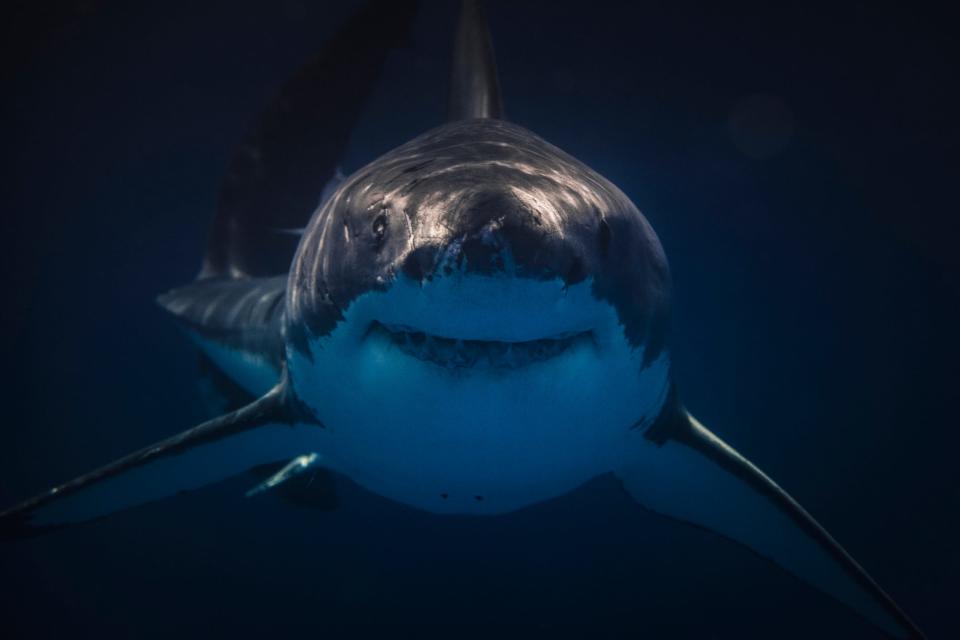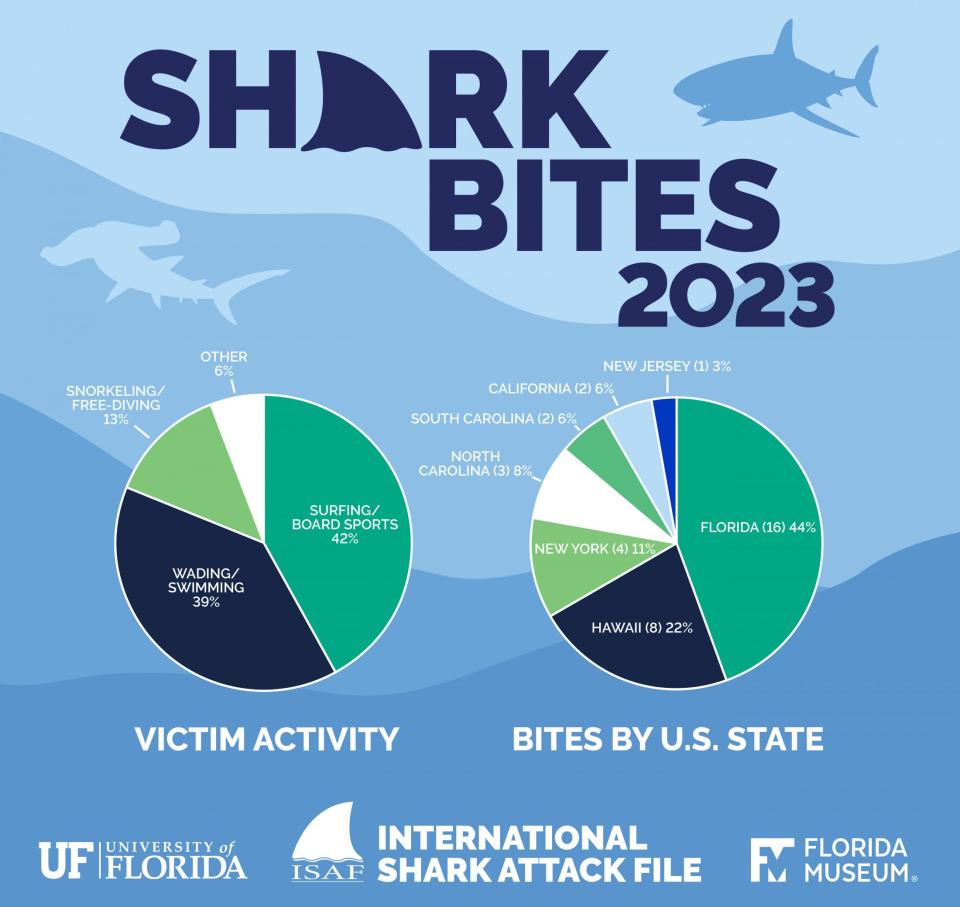Great white shark found dead on Panhandle beach. Are they typically found in Florida waters?
Beyond the surf, sand and sunshine, there's another factor many Floridians might think about while enjoying their beach day: sharks. However, those on a Panhandle beach got an extra close look at one over the weekend,
A dead female great white shark was discovered along the shore at Navarre Beach Friday, estimated to be between 13 and 15 feet long and 1,500 pounds.
Navarre Beach Fire Rescue District Fire Chief Danny Fureigh told the News Journal that a team from the National Oceanic and Atmospheric Administration (NOAA) was coming out to the site to collect blood samples of the shark, but a necropsy would not be conducted.
The exact cause of death is still unknown as of Feb. 26, but crews found some hooks in the shark's mouth.
Located between Pensacola and Destin, Navarre made headlines less than a month ago after two fishermen caught an estimated 12-foot great white shark. According to media outlets, they noted the shark was female and had scars on her body before releasing her.
Are great white sharks usually found to Florida?
Yes, they are. Florida has one of the largest year-round concentrations of sharks, especially for great whites.
Dr. Bob Hueter, chief scientist at OCEARCH, told the News-Press last year it's not rare to see white sharks head to the Gulf for the winter, explaining why they leave their homes up near Maine and Nova Scotia.
Just like snowbirds.
"As winter approaches, that availability of food gets lessened and it gets too cold for them, so they start moving south," Hueter said. "A lot of these white sharks, most of them actually, tend to kind of come down, they don't really hug the coast in the sense that they're right on the beach, but they stay in the continental shelf waters, most of them and they come south."
He also said many also stop in the Carolinas as well during their migration. In their research, OCEARCH is finding half of their tagged sharks heading to the Gulf of Mexico, definitely showcasing a pattern.
Are they actually called 'great white' sharks?
Great white sharks are also known as white sharks. Most scientists prefer to just use white shark when referring to the species, as there is no 'greater' or 'lesser' white shark.
Many theorize the reason why "great" was tacked onto its name is due to its size and reputation as one of the largest predators.

How big are great white sharks?
According to Oceana, they can grow to an estimated maximum length of 20 feet and weigh over 4,000 pounds.
Are great white sharks protected in Florida?
Yes, there are restrictions on catching great white sharks in Florida.
According to Florida Fish and Wildlife Conservation Commission, the white shark is included in the list of prohibited harvest, possession, landing, purchase, sale or exchange.
What led to the great white shark's negative reputation?
One word: "Jaws."
Hueter said since the 1975 blockbuster was released, the white shark has been targeted as being a "maniacal killer." Luckily, the tide is turning for these massive sharks.
"A lot of it's changing … actually the amount of hysteria over these animals is greatly reduced over the last couple of decades as we've gotten to understand the need for sharks in the oceans and their importance as apex predators in balancing the ocean," Hueter said.
He continued, "The fact is that they were severely depleted due to a variety of things, but white sharks are beginning to come back, because we've protected them and that's good. You're putting the oceans back into the balance."
Do white sharks actually bite the most? What sharks mostly bite humans
According to the University of Florida, the shark species responsible for most unprovoked bites on humans are the white sharks, tiger sharks and bull sharks.
They do note that all sharks regardless of size are predators and could be capable of inflicting wounds if provoked.
According to the International Shark Attack File, the state typically sees an average of 22 bites yearly.
More on shark bites: Everything on the 'shark bite capital of the world'
How can you avoid being bitten by a shark?

While the chances of being bitten by a shark are very rare, the FWC offers some tips on how to avoid being attacked while out in the ocean:
Always stay in groups since sharks are more likely to bite a solitary individual.
Do not wander too far from shore; this isolates an individual and places him or her far away from assistance.
Avoid being in the water during darkness or twilight hours when sharks are most active.
Do not enter the water if bleeding from an open wound or if menstruating — a shark's ability to smell blood is acute.
Wearing shiny jewelry is discouraged. When light reflects off shiny jewelry, it resembles the sheen of fish scales.
Avoid waters with known discharges or sewage and waters used for any type of fishing — especially if there are signs of baitfishes or feeding activity. Diving seabirds, which frequently feed on baitfishes, are good indicators of such activity.
While there are myths and anecdotes about dolphins saving humans from shark bites, the presence of dolphins does not indicate the absence of sharks — both often eat the same foods.
Use extra caution when the waters are murky.
Remember that sharks see contrast particularly well. Uneven tans and bright-colored clothing may draw a shark's attention.
Refrain from excess splashing, as this may draw a shark's attention.
Do not allow pets in the water; their erratic movements may draw a shark’s attention.
Be careful when occupying the area between sandbars or near steep drop-offs — these are favorite hangouts for sharks.
Swim only in areas tended by lifeguards.
Do not enter the water if sharks are known to be present, and get out of the water if sharks are sighted.
Never harass a shark.
Contributing reporting: Brandon Girod, Pensacola News Journal
This article originally appeared on Fort Myers News-Press: Great white shark found dead on Florida beach. Here's what we know

